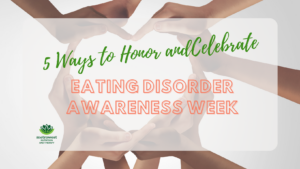
What Does ‘Non-Diet’ Really Mean? – Part 1
This is part one of a multi-part blog post explaining what the term ‘non-diet’ means.
So, what does this ‘Non-Diet’ term mean anyway? Let’s break it down.
Letting go of dieting may sound both terrifying and appealing, especially if you’ve been on the diet roller coaster for much of
your life. But what exactly does “not dieting” look like? Here, I’ll start introduce you to the main principles of the non-diet approach to nutrition
and health, and what to expect when working with a non-diet registered dietitian (RD). This post focuses on principle #1.
Non-diet principal #1: Diets (of any kind) don’t work
This is a harsh reality, but it’s the truth: any attempt to manipulate your weight by restricting your food intake or cutting specific foods out of your
diet is a form of dieting. While the obvious forms of dieting (shakes, meal replacements, cleanses) have decreased in popularity over the years, they
have been replaced by several, more subtle methods (calorie, point and macro counting, portion control, ‘clean eating,’ fasting). These latter forms
of dieting are often branded as “lifestyle” changes and marketed in such a way that makes them seem balanced and sustainable. But are they? The problem
is, these plans hinge weight loss, improved energy and well-being on strict adherence to food rules which, for the vast majority of people, are not
realistic over time.
diet is a form of dieting. While the obvious forms of dieting (shakes, meal replacements, cleanses) have decreased in popularity over the years, they
have been replaced by several, more subtle methods (calorie, point and macro counting, portion control, ‘clean eating,’ fasting). These latter forms
of dieting are often branded as “lifestyle” changes and marketed in such a way that makes them seem balanced and sustainable. But are they? The problem
is, these plans hinge weight loss, improved energy and well-being on strict adherence to food rules which, for the vast majority of people, are not
realistic over time.
These programs can cause stress, social isolation, preoccupation with food, and they don’t result in long-term weight loss. There isn’t a single well designed
study out there that can demonstrate a way of eating that helps people lose weight and keep it off for more than two years. In fact, the majority of
people who lose weight by intentionally restricting calories through any method end up regaining all of the weight they lost and then some. Our bodies
react to dieting the same way they react to starvation; metabolism decreases and food cravings increase. Not only does this cycle negatively affect
physical health, but it wreaks havoc on emotional and mental health as well.
study out there that can demonstrate a way of eating that helps people lose weight and keep it off for more than two years. In fact, the majority of
people who lose weight by intentionally restricting calories through any method end up regaining all of the weight they lost and then some. Our bodies
react to dieting the same way they react to starvation; metabolism decreases and food cravings increase. Not only does this cycle negatively affect
physical health, but it wreaks havoc on emotional and mental health as well.
Stay tuned for more to come!



